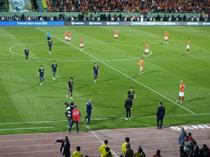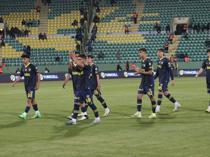National footballer leads Syrian opposition efforts
JAMES M. DORSEY

Abdelbasset Saroot (insert photo) calls on Syrian national team members not to play for Bashar al-Assad’s ‘oppressive regime.’ AP photo
A celebrated national football team goalkeeper, singer of revolutionary folk songs and cheerleader of the uprising against Syrian President Bashar al-Assad in the besieged city of Homs – in a sign of protesters becoming more religious – is increasingly couching his public remarks in Islamic terms while at the same time seeking to keep the door open to minorities, such as Christians.In a video dated April 13, Abdelbasset Saroot, who has been targeted by the regime on several occasions, called on Syrian mothers to prepare their sons for martyrdom in confronting the Assad regime’s brutal crackdown on the 15-month popular revolt that has brought Syria to the brink of civil war.
“I want to send a message to our mothers at home making Du’a [a Muslim religious invocation] for us: O mother, my shrouds are new, prepare a funeral procession for me for I have come to you as a martyr in my celebratory clothes, my new home is Jannah [paradise],” he chants to a square in Homs packed with people applauding him.
A player for Syria’s national Under-23 team, Saroot stands out in a region in revolt where football players feted by autocratic leaders and managers appointed by their regimes have remained largely on the sidelines of mass anti-government protests. At the heart of their reluctance to join popular revolts is what Palestinian-American historian Hisham Sharabi called neo-patriarchy in a controversial 1992 book that is still banned in many Arab countries.
The identification of the deposed leaders of Egypt, Yemen and Libya – Hosni Mubarak, Abdullah Ali Saleh and Moammar Qaddafi – as well as Iranian president Mahmoud Ahmadinejad had with their country’s national teams turned their successes and failures into barometers of how their regimes were faring. They also turned celebrated football players and managers into regime supporters who saw the autocrat as their father figure.
Syrian football is no exception to the rule and has as a result been increasingly polarized since last year’s eruption of anti-government protests. United Nations observers in Syria suspended their mission this week. They warned that the confrontation between al-Assad’s forces and armed segments of the opposition had produced a state of civil war in Syria and undermined efforts to establish a ceasefire.
Louay Chanko, a player for the Syrian national team, who stopped playing for the team because he also played for the Swedish Assyrian team Syrianska FC, said in an interview last month that many of the Syrian national squad’s players continued to play against their will. “Everything is corrupt. The SFF [Syrian Football Federation] just took players from the clubs. Many players didn’t want to play for the national team anymore. Players are so afraid,” Chanko said.
Fielding illegal players
The al-Assad regime was so desperate for a Syrian football success in a bid to shore up its wrecked image and demonstrate that the country was functioning normally that in the past year it went to great lengths to ensure that its national team would compete in international tournaments, including the fielding of illegal players. That prompted world football body FIFA to bar Syria last August from competing for the 2014 World Cup in Brazil after the team fielded an unnamed ineligible player in a qualifying match against Tajikistan. Lebanon subsequently accused Syria of fielding six players in an Under-19 Asian Football Championship qualifier whose ages had been falsified to qualify them for the team.
While Syria craves for an international success in football, Saroot, the curly, black haired football player prefaces his call for revolt with an invocation of Allah designed to appeal to both Muslims and Christians. Calling on the crowd to raise their hands, he said: “I bear witness that there is no God worth worshipping but Allah and I bear witness that Mohammed is His servant and messenger and I bear witness that Jesus was a messenger of Allah. There is no God but Allah.”
By referring to Jesus Saroot was, despite his Muslim terminology, reaching out to Syria’s Christian minority. Religious minorities in Syria, including the Kurds and the Druze, have remained on the sideline of the revolt for fear that forcing al-Assad out of office would pave the way for an Islamic regime that would be less tolerant toward minorities – a fear the Assad regime has sought to cultivate.
















